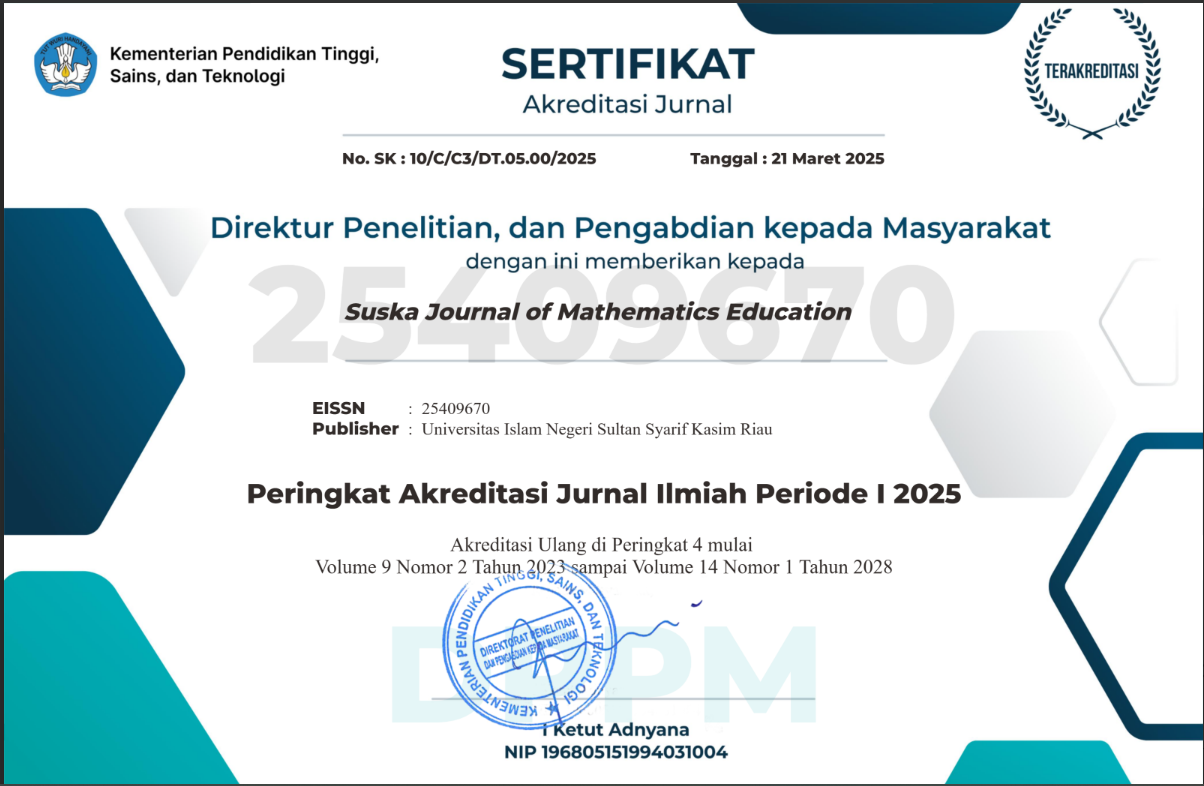Meningkatkan Kemampuan Pemecahan Masalah Matematis dan Self-Efficacy Siswa MTs Melalui Pendekatan Pendidikan Matematika Realistik
Abstract
The purposes of this research is to the differences in mathematical problem-solving skills enhancement and self-efficacy among students who had learned Realistic Mathematics Education (RME) approach and students who received conventional instructions. Reseach use quasi-experimental was used pre-test research design posttest control group design. The experimental group was treated using RME approach while the control group gain use conventional approach. To gather the instrument is the form of mathematical problem solving ability test, and a questionnaire to determine students' self-efficacy toward mathematics. This research was conducted at Secondary Islamic School . The population is grade VIII students MTsN Model Banda Aceh inl year 2012/2013. The samples were two classes, VIII-7, class as the experimental class and the control class VIII-6, by purposive sampling technique. The researc found that studens mathematical problem-solving ability which were taken by with RME approach better than conventional approaches. Based on the analysis of self-efficacy RME class increases more than the self-efficacy of students who received conventional learning. Furthermore there a relationship between the ability of solving mathematical problems with self-efficacy of students in the experimental class and control with very low qualifications.
Keywords
Full Text:
PDFReferences
Bandura. A. 1994, Self-efficacy. Dalam V. S. Ramachaudran (Ed.), Encyclopedia of Human Behavior, Vol. 4. New York: Academic Press. [online]. Tersedia: http://www.des.emory.edu/mfb/BanEncy.html
___________. 2006. Guide for Constructing Self-Efficacy Scales Dalam Frank Pajares & Tim Urdan (Ed)., Self-Efficacy Beliefs of Adolecents. [Online]. Tersedia: http://www.des.emory.edu/mfp/self-efficacy.html#books
Barry, J. Zimmerman. 2000, Self-Efficacy: An Essensial Motive to Learn. [Online]. Tersedia: http://www.idealibrary.com
Gravemeijer, K. 1994, Developing Realistic Mathematics Education. Utrecht: Freudenthal Institut. Netherland.
Handayani, Isnaini. 2009, Penggunaan Model Method dalam Pembelajaran Pecahan sebagai Upaya
Hake, R.R. 1999. Analyzing Change/Gain Scores. [Online]. Tersedia: http://www.physics.indiana.edu/~sdi/Analyzingchange-Gain.pdf
Saiful. 2012, Meningkatkan Kemampuan Pemecahan Masalah Matematik dan Self-Efficacy Siswa SD. Tesis. UPI: Tidak diterbitkan.
Syaiful, 2012. Peningkatan Kemampuan Pemecahan Masalah Matematis Melalui Pendekatan PendidikanMatematika Realistik. Jurnal Pendidikan Matematika dan Sains, Vol 02, No. 01, ISSN: 2088-2157
Sugiyono, 2013. Metode Penelitian Pendidikan. Bandung: Alfabeta.
TIMSS, 2011. International Association for the Evaluation of Educational Achievement.
DOI: http://dx.doi.org/10.24014/sjme.v3i2.4148
Refbacks
- There are currently no refbacks.

This work is licensed under a Creative Commons Attribution-NonCommercial-ShareAlike 4.0 International License.
Published by:

FLAG COUNTER






